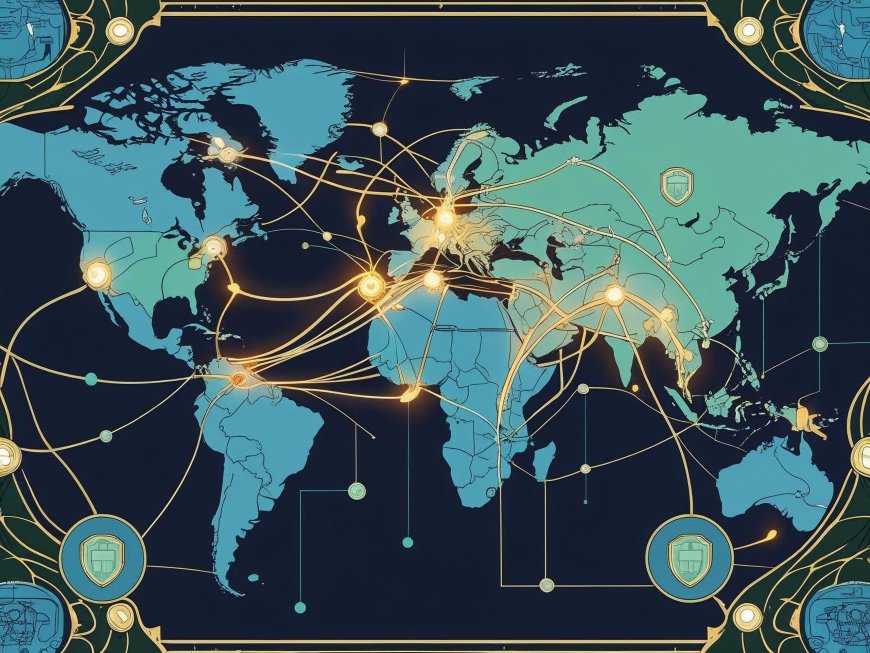Data Sovereignty and Cross-Border Health Records
This white paper explores the growing importance of data sovereignty in managing cross-border health records across Africa. It analyzes regulatory, ethical, and technological implications and proposes a framework for secure, patient-centered, and interoperable data exchange across national borders.

Abstract
As digital health systems expand across Africa, the governance of cross-border health data has become a pressing issue. While interoperability and mobility promise improved continuity of care, patient safety, and epidemic tracking, they also raise concerns about data sovereignty, security, and privacy. This white paper explores the challenges and opportunities of managing health records across borders, focusing on African Union goals, national regulations, and frameworks for ethical, legal, and technical interoperability.
Introduction
The rise of electronic health records (EHRs), telemedicine, and mobile health (mHealth) platforms is transforming healthcare in Africa. However, health data rarely respects national boundaries—particularly in regions with transnational populations, refugee flows, and shared disease burdens. Yet most African nations treat health data as a sovereign resource governed strictly within national borders (UNECA, 2021). As efforts toward continental health integration (e.g., Africa CDC, Smart Africa) grow, a harmonized approach to cross-border data governance becomes essential.
What Is Data Sovereignty?
Data sovereignty refers to the legal and political concept that data is subject to the laws and governance structures within the nation where it is collected or resides. In healthcare, this means:
-
Patient records collected in Country A must remain under Country A’s jurisdiction, even if accessed elsewhere.
-
Moving health data across borders requires regulatory agreements.
-
Cloud hosting in foreign data centers may violate sovereign data laws.
Example: Kenya’s Data Protection Act (2019) restricts cross-border transfer of sensitive data unless the destination country provides adequate safeguards.
Source
Why Cross-Border Health Records Matter
-
Medical Tourism – Patients traveling for care across borders need access to their clinical records.
-
Refugee & Migrant Care – Refugees often cross borders without accessible medical histories, impacting continuity of care.
-
Epidemic Surveillance – Real-time data exchange is vital for outbreak response (e.g., Ebola, COVID-19).
-
Health Worker Mobility – Clinicians working in multiple countries benefit from interoperable health information systems.
-
Regional Integration – Initiatives like the African Continental Free Trade Area (AfCFTA) require harmonized digital ecosystems.
Legal and Regulatory Fragmentation in Africa
While over 30 African countries have data protection laws, only a handful have specific clauses addressing cross-border health data (GSMA, 2022). Challenges include:
-
Varying definitions of “sensitive health data”
-
Lack of harmonized patient consent requirements
-
No pan-African legal instruments for health data exchange
-
Absence of trust frameworks among member states
Africa Union’s Malabo Convention (2014) encourages cooperation but remains under-implemented.
AU Treaty Reference
Current Cross-Border Health Data Practices
1. East African Community (EAC)
Pilot projects (like OpenHIE-based systems in Kenya and Uganda) have demonstrated technical feasibility but faced legal and policy barriers to true cross-border exchange.
2. Southern Africa
South Africa’s National Health Insurance (NHI) framework encourages regional data integration—but its POPIA law limits international transfers without mutual agreements.
3. Refugee Health (UNHCR & WHO)
UNHCR and WHO have used case-based tracking systems in camps (e.g., DHIS2 Tracker) to manage care for mobile populations, though data sovereignty remains contested.
Technology Enablers & Standards
-
FHIR & HL7: Open standards for clinical data structure and exchange.
-
OpenHIE: A modular framework for secure, standardized health data exchange.
-
Digital ID Systems: Cross-border compatibility through projects like MOSIP and Smart Africa’s interoperability stack.
-
Blockchain: Pilot projects are exploring blockchain for auditable, sovereign data trails (e.g., in Ethiopia and Nigeria).
WHO’s 2023 report recommends digital health trust frameworks based on shared governance, federated identity, and privacy-by-design.
WHO Report
Key Challenges
| Category | Challenge |
|---|---|
| Legal | Conflicting data protection laws; no continental agreement |
| Technical | Lack of shared standards; poor infrastructure in rural areas |
| Ethical | Informed consent across cultures/languages; patient autonomy |
| Trust | Concerns about data misuse by foreign governments or third-party vendors |
Strategic Recommendations
1. Create a Pan-African Health Data Governance Framework
Develop a harmonized legal and technical policy toolkit endorsed by Africa CDC and AU. This includes consent standards, certification bodies, and dispute resolution protocols.
2. Establish Health Data Trust Networks
Encourage bilateral or multilateral data-sharing agreements among neighboring countries, especially in high-mobility corridors (e.g., East Africa, ECOWAS region).
3. Build Federated Data Models
Enable data to remain in local systems but be queried securely via APIs when authorized. Avoid centralized mega-databases that risk sovereignty violations.
4. Incorporate Cross-Border Readiness in EMRs and HIEs
National EMRs should include interoperability hooks that comply with OpenHIE and FHIR standards.
5. Protect Patients with Cross-Jurisdictional Consent Protocols
Create digital consent mechanisms (mobile, multilingual, readable) that allow patients to control access to their health data—even across borders.
Conclusion
Cross-border health data exchange is both inevitable and necessary for a connected, resilient African health system. But it must be built on the principles of data sovereignty, interoperability, patient rights, and trust. Governments, regulators, and innovators must work together to ensure that as health systems integrate, individual nations—and patients—retain meaningful control over their data.
References (APA 7th Edition)
African Union. (2014). Convention on Cyber Security and Personal Data Protection (Malabo Convention).
https://au.int/en/treaties/african-union-convention-cyber-security-and-personal-data-protection
GSMA. (2022). Mobile privacy and data protection in Sub-Saharan Africa.
https://www.gsma.com/publicpolicy/wp-content/uploads/2022/11/GSMA-Mobile-Privacy-Africa.pdf
Kenya Office of the Data Protection Commissioner. (2019). Data Protection Act.
https://www.odpc.go.ke/
UNECA. (2021). Data governance frameworks for digital health in Africa.
https://repository.uneca.org/handle/10855/46742
World Health Organization. (2023). Digital trust architecture for health data exchange.
https://apps.who.int/iris/handle/10665/341981
What's Your Reaction?
 Like
0
Like
0
 Dislike
0
Dislike
0
 Love
0
Love
0
 Funny
0
Funny
0
 Angry
0
Angry
0
 Sad
0
Sad
0
 Wow
0
Wow
0



















































